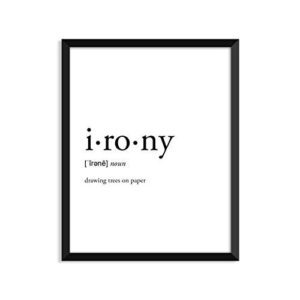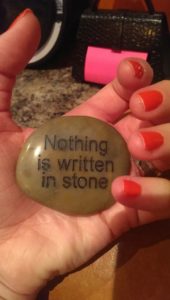What is Irony? Explanation with Examples
Have you ever read a book or watched a movie and noticed something strange? Something that seemed to be the opposite of what was expected, but still made perfect sense? If so, then chances are you’ve experienced irony – one of the most powerful literary devices in storytelling.
The irony is defined as “the expression of one’s meaning by using language that normally signifies the opposite, typically for humorous or emphatic effect.” In other words, it is when an author says one thing but means another. It can be used to add humor and wit to stories while also conveying deeper messages and meanings.
In this blog post, we will discuss the concept of irony in literature with relevant examples and understand how you can write irony for greater dramatic effect. We will explore how authors have used irony effectively to enhance their stories and make them memorable for readers throughout time. So let us begin!
- What is irony and how is it used?
- The Power and Importance of Using Irony in Writing
- Different Types of Irony
- Verbal Irony
- Situational Irony
- Dramatic Irony
- Other renowned examples of irony in literature
- How to write Irony?
- Tips for Writing Effective Irony
- How to Use Irony Creatively to Enhance Your Storytelling
- Common mistakes to avoid when writing irony
- What is irony and how is it used?
Irony is a literary device widely used by writers to express emotions and ideas in an indirect yet powerful way. The basic concept of irony is when what is expected to happen is the opposite of what actually happens. It can often be used to surprise and intrigue readers, making it an effective and popular tool for authors.
Irony comes in different forms such as verbal irony, where characters say one thing but mean another; and situational irony, where an event or outcome turns out in direct opposition to what was expected. Authors use this literary device to depict both sarcasm and wit, making it a versatile and often humorous form of expression.

Despite its complexity, irony serves as a useful tool for writers since it gives readers depth and perspective into characters, situations, and themes within their writing. It allows them to explore ideas beyond surface-level analysis which helps give us greater insight into not just the character doing the speaking or thinking but also often the circumstances they are in.
The Power and Importance of Using Irony in Writing
The power of irony in creative writing is crucial to crafting a captivating story. Irony, the contrast between expectations and what actually happens, adds a powerful element to your story by creating an unexpected twist and generating suspense. Done skillfully, irony can be used as a literary tool for providing clues and stimulating interest in your work. It can also be employed to express subtle messages about a character’s personality or to illustrate difficult themes or topics.
The cleverly placed irony within your work can help engage the reader, create tension and excitement, encourage dialogue, and even evoke emotion. In other words, irony is integral to enhancing your storytelling experience. When used correctly within your writing structure, it has the potential to take your readers on an alluring journey that they won’t soon forget.
Different Types of Irony
Irony is a powerful tool used by writers and speakers to emphasize a point or illustrate a disparity between what was said or expected and what actually occurred. Different types of irony can be distinguished in literature and speech, often causing confusion when trying to understand the meaning.

Verbal irony is perhaps the most recognized – this involves saying something that you don’t quite mean, such as “That’s just great!” right after receiving bad news. Situational irony is when events occur that are the opposite of what was intended.

Dramatic irony takes place when a character says something they think is true but the audience knows is false, like Romeo believing Juliet has died in the famous scene from Romeo and Juliet. Whether it’s verbal, situational, or dramatic, these ironic moments add depth and complexity to stories and conversations alike.
Verbal Irony
Verbal irony is a type of figurative language that is often used by writers to enhance or contrast an existing situation. It occurs when a speaker says one thing but means something the opposite. A verbal irony’s literary significance can be found in its ability to embellish a story with humor and add complexity to the narrative.
In Charles Dickens’s novel A Tale of Two Cities, he famously penned this verbal irony, “It was the best of times, it was the worst of times” to emphasize both the horrors and joys taking place throughout the book.
Through verbal irony, writers are able to deliver their message more effectively because it allows readers to comprehend multiple layers within a text that may have otherwise been unclear without the use of verbal irony.
Situational Irony
Situational irony is when an event in a story or narrative turns out quite different from what was expected. It can be used to create poignancy or even hilarity, depending on the circumstances and its literary significance varies with the context.
Popular literature makes frequent use of situational irony; for example, in William Shakespeare’s Romeo and Juliet, we are well aware of their doomed fates long before they lay eyes on one another – a tragedy that befalls them both despite their young love.
Ironically, the couple’s separation through death is what reunites their two feuding families. A more modern example can be found in Harper Lee’s To Kill a Mockingbird — when justice fails innocent Atticus Finch despite his honorable moral character and devotion to justice.
We wish for him to excel against all odds unlike most other stories involving situational irony where characters fail miserably despite having high expectations. This ultimately proves situational irony to be an effective tool in relaying a message while telling an engaging story.
Dramatic Irony
Dramatic irony is a powerful tool used by writers to create dramatic tension and suspense, as well as enhance the dramatic effect. It is often an unintended communication between characters in a story, where the audience or reader has knowledge about what will happen that the character does not. This can lead to dramatic surprises that leave the audience captivated. Examples of dramatic irony can be seen in popular literature such as “Oedipus Rex” by Sophocles and “Romeo and Juliet” written by William Shakespeare.

In “Oedipus Rex” for instance, Oedipus unknowingly kills his own father and marries his own mother, two events which are key plot points the audience knows before Oedipus does. Similarly, in Romeo and Juliet, while they both know they are from rival families, they don’t learn until it’s too late that their parents have arranged marriages for them to people other than each other — another dramatic reveal that grips viewers with suspense. Ultimately, dramatic irony demonstrates how flaws in human understanding lead to unexpected consequences — a literary device timelessly used throughout history.
Other renowned examples of irony in literature
When discussing renowned examples of irony in literature, two major works that are often cited are O. Henry’s The Gift of the Magi and Mark Twain’s The Adventures of Huckleberry Finn. In The Gift of the Magi, a young married couple sacrifices their most treasured items to purchase gifts for one another, only to discover that each item’s purpose has been rendered useless by the other’s selfless gesture.

This serves as a lesson for writers: irony can be used to drive home a deeper meaning or serve as commentary on an issue, emphasizing the idea that it may not always be possible to have what one desire.
Similarly, The Adventures of Huckleberry Finn explores how society’s structures do not always align with individual morality while utilizing pervasive irony as commentary on human nature– ultimately reminding writers that when constructively used, irony can reveal truths better left unsaid.
How to write Irony?
Irony is a powerful, yet subtle literary device used to add depth to stories by conveying the opposite of the literal meaning. Every writer needs to understand how and when to use irony in their stories effectively. To write using irony, one must first identify the underlying context behind their words, then convey that feeling and intent through the writing.
If your character has been blindsided by an event or outcome, sarcastic or witty words can be used in dialogue or description to illustrate how they feel. It’s not always easy for readers to catch on immediately, but once they do your story will come alive with recent emotion and depth.

To further enhance this device, try adding unexpected characters that serve as foils for each other’s opinions or twist the plot in an ironic manner. Ultimately, no matter how you decide to implement it into your writing, irony should deepen the understanding of our readers about the emotions embraced in your story.
Tips for Writing Effective Irony
Writing effective irony requires more than simply understanding what irony means. By starting with an awareness of the different types of irony that can be used to convey subtle messages, authors can develop tips and techniques for making their desired ironic effects memorable.
Try these pointers to start writing effective irony
One of the most useful tips is to find the humorous element in a situation and infuse it into the narrative or dialogue, as seen in the work of many classic authors. Another important aspect to consider is using unexpected words or ideas as a way to spark interest and draw focus on a particular point, often showing how much more complex reality truly is.
Finally, one should also strive for consistency within their work by not pushing the limit too hard – sometimes letting the irony speak for itself is better than overworking it. With these tips in mind, you can craft compelling stories that get your readers reflecting and enjoying every little bit of surprise!
How to Use Irony Creatively to Enhance Your Storytelling
Irony can be a powerful and important tool when it comes to creative storytelling. At its core, irony is the contrast between what is expected and what actually occurs. By creating irony in a story, authors can highlight subtle truths that traditional narratives may overlook. Using irony to twist the expectations of characters leads to unexpected plot developments that captivate readers. Additionally, irony can be used cleverly to introduce elements of humor in an otherwise serious narrative.
Where to start?
To utilize irony effectively, start by highlighting irony through dialogue and then extend these moments into plot points. Paying attention to dramatic irony will also add depth and meaning for your reader as well as provide entertaining twists along the way. Used correctly, irony can make all the difference in creating interesting stories that readers love!

Common mistakes to avoid when writing irony
When it comes to writing irony, common mistakes can ruin the intended effect of the text. One common mistake is not to express enough contrast between the expected and actual result – for example, this often occurs when there is not enough emphasis put on the surprise element or joke.
Satire and Irony
Another common mistake is confusing satire with irony, as although these two tones of voice can sometimes overlap, they still have differences in their meaning that require attention.
Watch out for the Literal Meaning
Lastly, it is essential to take into consideration the literal meaning when trying to write an irony; if there is any confusion over what an ironic phrase means then clarity and impact of the overall message will be lost. If common mistakes like these can be avoided, it will make writing and understanding irony effective and satisfying.

